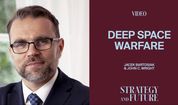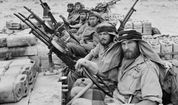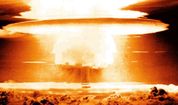The Last 21 Years: Year (2)001

(Source: wikiquote.org)
John Mearsheimer introduced his book The Tragedy of Great Power Politics (2001) on a typically cautionary note, warning that “even though the Soviet threat has disappeared, the United States still maintains about one hundred thousand troops in Europe and roughly the same number in Northeast Asia. It does so because it recognizes that dangerous rivalries would probably emerge among the major powers in these regions if U.S. troops were withdrawn. Moreover, almost every European state, including the United Kingdom and France, still harbors deep-seated, albeit muted, fears that a Germany unchecked by American power might behave aggressively; fear of Japan in Northeast Asia is probably even more profound, and it is certainly more frequently expressed. Finally, the possibility of a clash between China and the United States over Taiwan is hardly remote. This is not to say that such a war is likely, but the possibility reminds us that the threat of great-power war has not disappeared.”
Mearsheimer takes a particularly hawkish (and forward-thinking) line on the rise of China, arguing that “a policy of engagement is doomed to fail. If China becomes an economic powerhouse it will almost certainly translate its economic might into military might and make a run at dominating Northeast Asia. Whether China is democratic and deeply enmeshed in the global economy or autocratic and autarkic will have little effect on its behavior, because democracies care about security as much as non-democracies do, and hegemony is the best way for any state to guarantee its own survival. Of course, neither its neighbors nor the United States would stand idly by while China gained increasing increments of power. Instead, they would seek to contain China, probably by trying to form a balancing coalition. The result would be an intense security competition between China and its rivals, with the ever-present danger of great-power war hanging over them. In short, China and the United States are destined to be adversaries as China’s power grows.”
Of course, rather than being about the gradual build-up towards superpower confrontation between the United States and China, 2001 is remembered for the shocking and immediate way in which the US found itself deeply entangled in global affairs not just as a hegemon but as a victim.
We tend to think of Al-Qaeda primarily as an international Islamist terror network. This distracts slightly from the fact that all nineteen of the 9/11 hijackers were native Arabic speakers and that their remote base in Afghanistan was foreign territory. According to Guido Steinberg, “The [1979-1989] war in Afghanistan was won by the Afghans. The Arabs joined in at a late stage and played hardly any role militarily. It’s always said Osama bin Laden participated in a single battle in 1987 but on the whole, it’s quite clear that the Arabs were more like jihad tourists rather than genuine rebels who contributed militarily to the success of the whole enterprise.”
Lawrence Wright says of the war aims of bin Laden that, “he wanted the United States to replicate the same problem that had happened to the Soviet Union which was that the Soviets went into Afghanistan in 1979 and spent ten years there and withdrew and what happened? The Soviet Union shattered. It fell apart! And Bin Laden actually believed that he could do the same thing to the United States. It would become the dis-United States and that would open up the way for Islam to regain its rightful place as the preeminent power in the world.”
“Most terror is a form of theatre.” Wright continues. “The terrorists want to gain attention for their causes. What separates Al-Qaeda from other terrorist groups is that it also has an appetite for blood. It wants to leave as many bodies on the ground as possible. So there was a dual goal in these attacks: one was to create these amazing cinematic images that would be unforgettable, as they are, and the other was to kill as many people as they could. Those two things make Al-Qaeda really unique: their aspirations for these unbelievably dramatic effects and their love of carnage.”
The 11th September 2001 terrorist attacks killed nearly 3,000 people and elicited an angry and confused/confusing reaction from writers like Salman Rushdie and Martin Amis, who felt a duty to attempt to make sense of something that seemed so incomprehensible.
Rushdie: “For a vast number of ‘believing’ Muslim men, ‘Islam’ stands, in a jumbled, half-examined way, not only for the fear of God — the fear more than the love, one suspects — but also for a cluster of customs, opinions and prejudices that include their dietary practices; the sequestration or near-sequestration of ‘their’ women; the sermons delivered by their mullahs of choice; a loathing of modern society in general, riddled as it is with music, godlessness and sex; and a more particularized loathing (and fear) of the prospect that their own immediate surroundings could be taken over — ‘Westoxicated’ — by the liberal Western-style way of life.”
Amis: “[Whereas] socialism was a modernist, indeed a futurist, experiment, … militant fundamentalism is convulsed in a late-medieval phase of its evolution. We would have to sit through a renaissance and a reformation, and then await enlightenment. And we’re not going to do that.”
Operation Enduring Freedom, the US-British invasion of Afghanistan (which Bin Laden had aimed to provoke), was launched less than a month later. In 2002, the 24-year old former diplomat Rory Stewart walked around 800 km from Herat to Kabul, “in a straight line through the central mountains … [where] there was no electricity, no television, and no T-shirts. In many houses, the only piece of foreign technology was a Kalashnikov, and the only global brand was Islam.” How a new wave of foreign occupiers would fare in such a country where others hadn’t was not at all clear.
As US Defence Secretary Donald Rumsfeld put it at the time, “We’re so conditioned as a people to think that a military campaign has to be cruise missiles and television images of airplanes dropping bombs, and that’s just false. This is a totally different war. We need a new vocabulary. We need to get rid of old think and start thinking about this thing the way it really is. These people live in the shadows.”
In the world of the bright light of electricity, televisions and T-shirts, 2001 was the year the portable tech revolution really began to really get underway. MP3 players already existed but they looked ugly, like pseudo-futurist mobile phones from the 1980s and 1990s. With the launch of the iPod, Apple combined cutting-edge technology (“1000 songs in your pocket”) with Bauhaus-inspired minimalist style (form follows function, less is more). In fact, it was very clearly an homage to the visuals of the 1958 Braun Transistor Radio T3 designed by the legendary Dieter Rams. The “intuitive navigation wheel” (or “scroll wheel” or “click wheel”) was an idea borrowed from Bang & Olufsen’s Beocom 6000 mobile phone (released in 1999) and would soon be made obsolete by touchscreen technology but the lack of buttons was an aesthetic leap forward and it’s for this reason that I would suggest Apple’s soft-spoken vice president of industrial design, Jony Ive, as Man of the Year for 2001.
The devices were of course assembled by Foxconn at their sprawling factory precinct on the northern outskirts of Shenzhen, a city whose port was on its way to becoming one of the busiest in the world (along with the nearby Ports of Hong Kong and Guangzhou) and whose businesses were looking to climb the R&D development ladder (notably Huawei). Peter Bialobrzeski’s photographs of Shenzhen in 2001 (part of the Neon Tigers series) show a city modernising quickly, its population having tripled to 7,000,000 in just ten years. For the iron ore miners and exporters of Western Australia, China’s rise was cause for celebration. For advocates of Mearsheimer’s “offensive realism,” it was more a cause for concern.
Autor
Thomas Riley
Thomas Riley runs the Flows and Frictions podcast for Strategy&Future. Originally from Manchester, England, he has been living and teaching English in Katowice since 2009.






Trwa ładowanie...